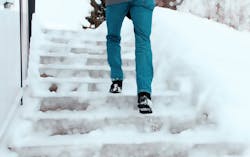How Property Managers Can Prevent Slips and Falls
Over $70 billion is paid out every single year as a result of employee slips and falls. Falling is the No. 1 cause of accidental injury, and the No. 2 cause of accidental death in the United States, according to the WHO.
Property managers and owners have a legal obligation to be proactive in addressing the risk of falling, especially as the winter months approach. If risks aren’t minimized, it could result in some costly consequences for everybody involved.
Causes of Slips and Falls
There are four main reasons a person might slip or fall. While these reasons do seem to be fairly common sense, it’s important to keep them in mind nonetheless.
Walkway Condition
When walking surfaces are slippery or wet, it can make people more prone to slips and falls. Additionally, if surfaces are uneven or contain changes in type, like a transition from a rough surface to a smooth surface, these differences can create hazard areas.
Walkway Changes
Steps, curbs or ramps can easily become a risky spot for many. The physically deficient, the ill or just the plain distracted walkers can all be a victim of a change in walkway.
External Conditions
Whether it’s the lighting, the weather or temporary obstructions like a large tree branch, trips and falls can be increased depending on the external conditions.
Individual Circumstances
Reduced physical abilities, the choice of footwear and distractions such as mobile phone usage or navigating around others can increase the risk of slip, trip and fall incidents.
Solutions for Slips and Falls
While property managers and owners may not be able to eliminate all falls, there are certain steps they can take to ensure they are appropriately managing the risk of a slip and fall occurrence.
1. Training and Education
Properly trained staff members are a property manager's best asset in preventing slip and fall accidents. Regularly educate employees about winter safety protocols, such as the importance of wearing appropriate footwear, where to park and being aware of changing weather conditions. Highlight the hazard areas of the walkways with your staff to ensure everyone is adequately prepared.
As silly as it sounds to make mention of a curb or a transition from pavement to sidewalk, it will increase the mindfulness of the staff. Employee safety training should be an ongoing process, but it’s also helpful if there is a written plan in place.
2. Snow and Ice Removal
According to many slip and fall studies—yes, it’s probably not surprising that there are several councils and people devoted to studying this slipping and falling thing, 80% of slips and falls occur because of snow or ice. A strong majority of these incidents also take place in the morning hours.
If snow and ice removal is performed in-house, be prepared to be the first one in and the last one out during the winter months. Responsibilities should be assigned for monitoring forecasts, maintaining supplies of salt/sand, maintaining snow removal equipment and monitoring that the work is done well.
If you plan to find a company to battle the snow and ice for you, choose wisely. Snow and ice doesn’t work on an 8 to 5 schedule and neither should a snow removal contractor. Find out how quickly they can be on site for a snow emergency by asking where their hubs and equipment are located and when they are available to salt or plow. Be sure to lay out an in-depth plan so everyone knows what to expect.
3. Anti-Slip Measures
Consider the lighting in parking lots and around walkways. Insufficient lighting during the winter can exacerbate slip and fall risks. Good visibility reduces the chances of accidents in icy conditions.
Anti slip mats should be at all entrances. These mats should include runners that extend further than the normal rugs that are used during the rest of the year as well. Mats will quickly become wet, and their effectiveness is void if there isn’t an adequate space for wiping shoes.
Signs should be used to alert walkers of a wet walkway. As an added note to this end, buying a sign that utilizes humor is typically more effective than the normal caution sign. For instance, a sign that says “Caution, icy, walk like a penguin” will be more likely to grab the attention of walkers.
4. Emergency Preparedness
To be prepared for emergencies related to slip and fall occurrences, property managers should establish a comprehensive emergency response plan that outlines clear steps for assessing incidents, providing immediate assistance, and contacting appropriate medical help if necessary. This plan should be complemented by staff training in first aid and emergency procedures, as well as the maintenance of readily accessible first aid supplies and communication protocols for reporting incidents to emergency services.
Moreover, property managers should place a high importance on maintaining precise records of slip and fall incidents, along with the preventive actions implemented to reduce slip and fall hazards. Utilizing security cameras can assist in post-incident reviews following a slip and fall occurrence.
Property and facility managers play a pivotal role in maintaining safety during the winter months. By implementing proactive snow risk management strategies, they can create a safer environment for employees, visitors, and tenants while reducing potential liabilities. From snow and ice removal to employee training and emergency preparedness, these practical measures can make a significant difference in mitigating slip and fall risks. Stay ahead of the curve in snow risk management, and your property will be safer and more resilient during the winter season.
About the Author
Tom Marsan
Tom Marsan is a certified snow professional who has been in the landscaping and snow removal industry for about two decades. He is an active member of ILCA and SIMA and is currently the General Manager at Beverly Companies in Chicagoland.
